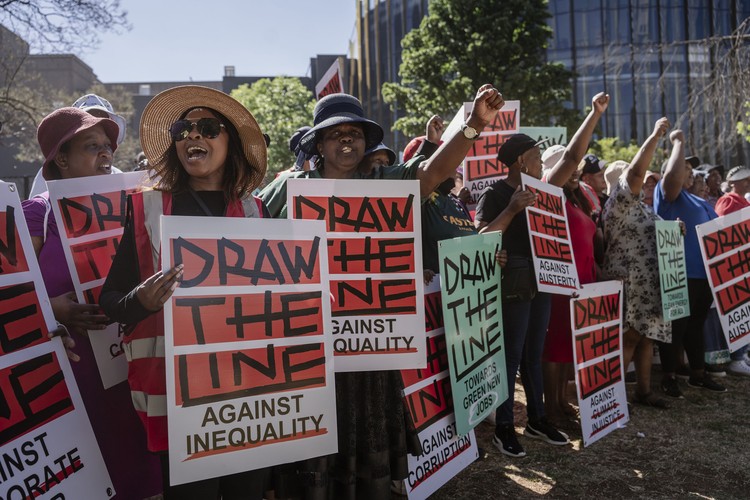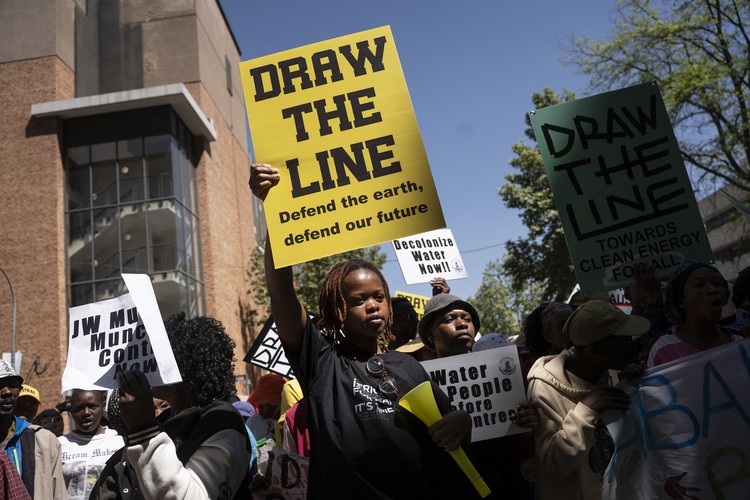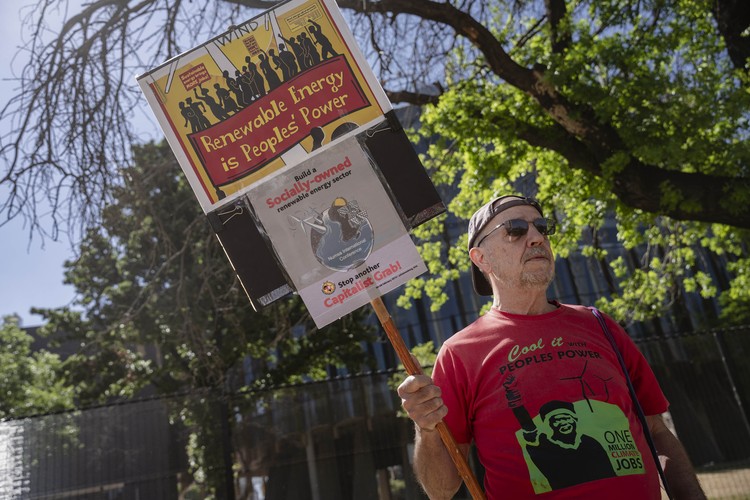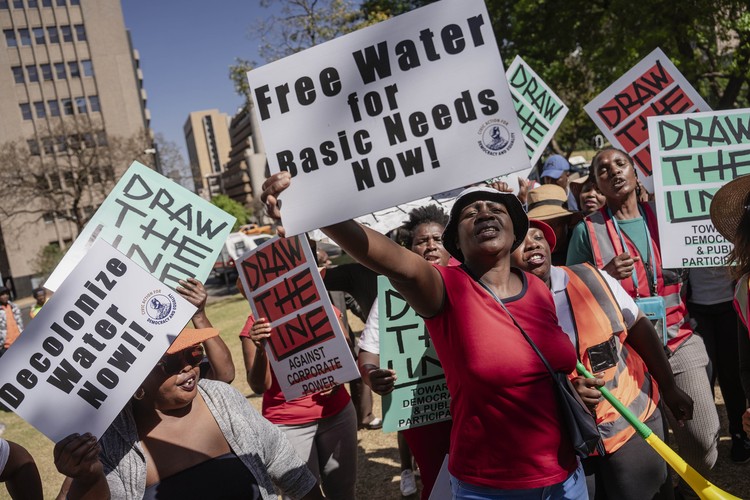Hundreds protest for climate solutions
Protestors complain of a lack of access to water and electricity, demanding environmentally sustainable solutions
About 500 people from communities across Johannesburg participated in the Draw the Line/People’s Power Campaign to demand an energy transition that puts people and communities, not profit, at its centre. Photos: Ihsaan Haffejee
Hundreds of people marched in Braamfontein on Thursday against climate change. The protest was organised by activist groups 350africa.org and the Climate Justice Coalition, as well as community organisations from Orange Farm, Eldorado Park, Soweto and Freedom Park.
The organisers said they were uniting under the Draw the Line/People’s Power Campaign to demand an energy transition that puts people and communities, not profit, at its centre.
People gathered outside the City of Johannesburg Council Chamber and made their way around Braamfontein, ending up outside the office of Johannesburg Mayor Dada Morero.
Protesters gathered outside the City of Johannesburg Council Chamber and made their way around Braamfontein, ending up outside the office of Johannesburg Mayor Dada Morero.
Activists said that one of the goals of the protest is to push for Integrated Development Plans (IDPs) that prioritise affordable energy for low-income communities. An IDP is a five-year strategic planning tool used by municipalities to coordinate their development activities and service delivery.
“Our municipalities have the authority to develop or procure renewable energy, creating opportunities for public and community-owned energy projects. Municipalities spend billions on electricity, but investing in socially owned renewable energy could free up budgets, expand basic electricity access, and reduce reliance on costly electricity purchases,” read a statement issued by the organisers of the protest.
Protesters demanded socially owned renewable energy projects.
Protesters also raised concerns about access to water and electricity, as well as municipal corruption and austerity measures, which they claimed are stifling development in their communities.
Many at the march expressed their disappointment that Mayor Dada Morero did not receive their memorandum. Activists addressed the crowd as members of the mayor’s office stood behind a line of police, listening.
Cleopatra Shezi from the Climate Justice Coalition said: “We need to change the system of how communities are engaged and serviced. Because we can change the mayor and still nothing will change, as we have seen over the last few years,” said Shezi.
Sandile Mokhuane from Freedom Park issued a warning to the officials at the mayor’s office: “We know that you will be coming to our communities soon and asking us for our votes because there are local elections next year. We will not be voting for corrupt and incompetent leaders because our communities are suffering.”
Lack of access to clean tap water was also at the forefront of the protest.
The protesters demanded socially-owned renewable energy, training opportunities in the green economy, improved infrastructure and for municipalities to reduce environmental harm, especially from mining.
The list of demands was handed over to a representative from the mayor’s office, who indicated that he would pass it to the mayor.
Support independent journalism
Donate using Payfast

Don't miss out on the latest news
We respect your privacy, and promise we won't spam you.
Next: Chart of the week: Getting guns off the streets
Previous: Gauteng community’s taps run dry as municipality battles R1.4-billion water debt
Letters
Dear Editor
Your article on the Johannesburg climate protest captured a truth we can no longer ignore: climate justice is not a side issue – it’s the fight for our survival. When communities march for clean water, affordable electricity, and a just energy transition, they are demanding dignity, not charity.
As someone who has seen the impact of water shortages and rising energy costs in my own community, I know these struggles are real. They are not statistics; they are families choosing between food and electricity, children walking kilometres for water, and young people losing hope for a future in a collapsing system.
This is not the time for polite appeals. It’s time for action:
- Show up at Integrated Development Plan (IDP) meetings and demand accountability.
- Support community-owned renewable projects that put people before profit.
- Join movements like the Climate Justice Coalition – because silence is complicity.
To those in power: stop hiding behind empty promises.
To fellow citizens: this is our fight. If we don’t act now, we inherit a future of scarcity and suffering. The line has been drawn. Which side are you on?
Thank you for giving space to these voices. Keep amplifying them – because the struggle for climate justice is the struggle for life itself.
© 2025 GroundUp. This article is licensed under a Creative Commons Attribution-NoDerivatives 4.0 International License.
You may republish this article, so long as you credit the authors and GroundUp, and do not change the text. Please include a link back to the original article.
We put an invisible pixel in the article so that we can count traffic to republishers. All analytics tools are solely on our servers. We do not give our logs to any third party. Logs are deleted after two weeks. We do not use any IP address identifying information except to count regional traffic. We are solely interested in counting hits, not tracking users. If you republish, please do not delete the invisible pixel.




